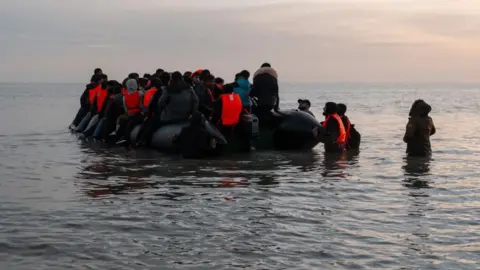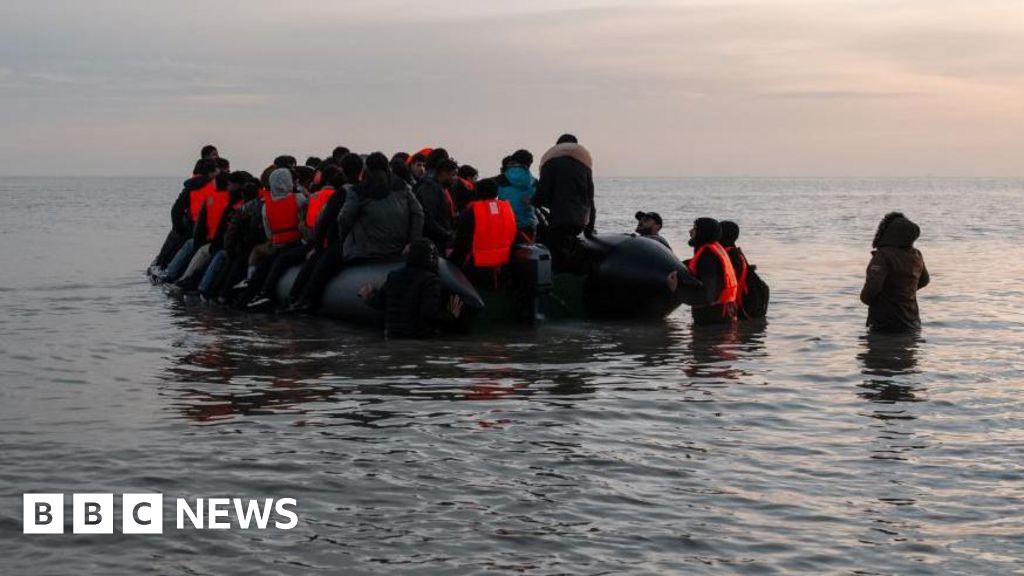 Getty Images
Getty ImagesThe Home Office has announced it will fund a further 300 National Crime Agency (NCA) officers to help tackle people smugglers behind English Channel crossings.
The officers will be funded by a £100m allocation from within the department’s budget, along with investment in new technology and equipment.
More than 25,000 people made the journey from France to the UK in small boats before the end of July, a record for this point in the year.
Home Secretary Yvette Cooper said the move would help the UK better “track the [smuggling] gangs and bring them down”. The Conservative Party called it a “desperate grab for headlines which will make no real difference”.
The record number of crossings mean the government is eager to show that it is working to reduce the numbers of people making the journey across the Channel.
While Sir Keir Starmer has been careful to avoid making a specific pledge to “stop the boats” like Conservative predecessor Rishi Sunak, his advisers know that his promise to “smash the gangs” needs to bear fruit at some point.
The government is also trying to tackle some of the most visible signs of the issue in the UK, committing to close all asylum hotels before the next general election and speed up the appeals process for failed asylum seekers.
A “one in, one out” pilot scheme will be signed with France later this week, which aims to deter migrants from crossing the Channel.
Under the scheme, some arrivals would be returned to France, and in exchange the UK would accept an equivalent number of asylum seekers, subject to security checks.
Speaking to BBC Breakfast, Border Security and Asylum Minister Angela Eagle would not be drawn on how many people would be returned to France.
Adding that a returns agreement with the EU was not put in place after Brexit, she told the programme: “At the moment, we’re not in a position from a standing start to return absolutely everybody”.
“There is no easy, one-step solution – it’s a complex problem that’s been allowed to take hold of our borders for six years.”
The Home Office will target smuggling kingpins who have operations across Europe, the Middle East, Africa and elsewhere.
Cooper said gangs had shown “a ruthless ability to adapt their tactics and maximise their profits, no matter how many lives they put at risk”.
The NCA has 91 ongoing investigations into people-smuggling networks affecting the UK, the agency’s director general of operations Rob Jones said.
Downing Street said the 300 further NCA posts would be in addition to extra specialist investigators and intelligence officers announced last year.
Shadow home secretary Chris Philp accused Labour of having “no serious plan” to tackle the issue.
“The British public deserves real action, not empty slogans and tinkering at the edges,” he said.
Writing in the Daily Express, Reform UK leader Nigel Farage said it was an effort to “throw taxpayer money at the illegal immigration crisis and hope it will go away”.
“Another £100 million here or there won’t move the needle. It won’t stop the boats or the gangs,” he added.
Labour and previous Conservative governments have both struggled to reduce the number of people coming to the UK illegally in small boats.
The Conservatives had proposed sending arrivals to Rwanda, but the scheme was delayed by legal challenges. The general election was called before it could be implemented.
One of Sir Keir Starmer’s first acts as prime minister was to scrap the plan, calling it a gimmick.
In another measure, which was revealed on Sunday, people advertising illegal Channel crossings online could face up to five years in prison under a new offence the government plans to introduce.
Assisting illegal immigration to the UK is already a crime, but officials believe the new offence would give police and other agencies more power to disrupt criminal gangs.
It would criminalise the creation of material for publication online which promotes or offers services that facilitate a breach of UK immigration law.
This would include people using social media to advertise fake passports or visas, or the promise of illegal work opportunities in the UK, and as well as jail time could carry a large fine.
The government has also confirmed that from next month, it will tighten rules that aim to stop migrants using university study as a way to enter the UK, in order to later claim asylum.
Under the plans, the visa refusal and course completion rates that universities have to meet in order not to risk losing their ability to sponsor future visas are to be made stricter.
Universities UK has called for “improved, real-time data sharing” with the Home Office to allow institutions to “respond proactively to emerging risks”.




